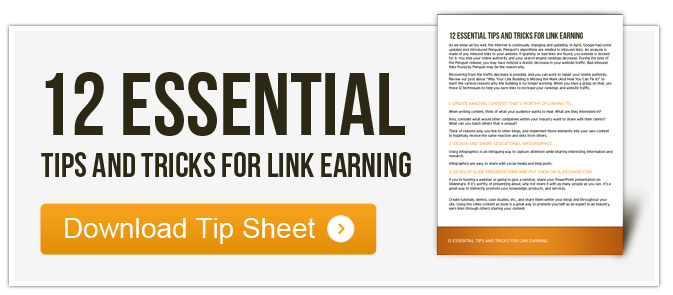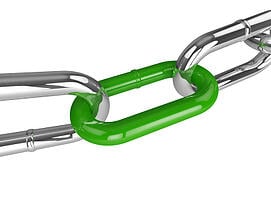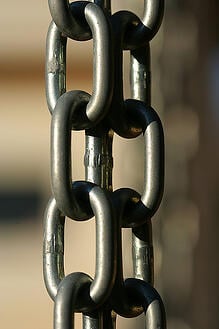Inbound linking and off-page Search Engine Optimization (SEO) make up 75% of your site SEO, with the last 25% being the on-page optimization. (HubSpot) Pretty interesting statistic, huh? Makes you think about stepping up your link building game and revaluate your plan, doesn’t it?
 Earning links is so important not only for SEO purposes, but also because it builds your online authority. Being an online authority means you are considered a thought leader on a specific topic. If you’re an online authority, the odds are in your favor of increasing your search engine rankings. Search engines consider inbound links as votes – the more votes (or links) the higher your website will rank. If you have bad inbound links, it takes away from your authority, you’re no longer trusted as a credible resource, and your rankings decrease. It’s also important to note that not all inbound links are created equal. Links with online authority are going to have more value and help your website.
Earning links is so important not only for SEO purposes, but also because it builds your online authority. Being an online authority means you are considered a thought leader on a specific topic. If you’re an online authority, the odds are in your favor of increasing your search engine rankings. Search engines consider inbound links as votes – the more votes (or links) the higher your website will rank. If you have bad inbound links, it takes away from your authority, you’re no longer trusted as a credible resource, and your rankings decrease. It’s also important to note that not all inbound links are created equal. Links with online authority are going to have more value and help your website.
Examine your current inbound link building plan to ensure you’re not making poor link building mistakes, and retain your online authority.
- Submitting your site to directories isn’t necessarily a good tactic anymore. Avoid link farms (black hat links). Don’t post your content on article sites. Do not pay for links.
- Only submit your site to directories that are credible and will provide value to your company.
- These are groups of website that link to each other. They’re only going to hurt your website ranking because they don’t provide any value.
- Simply post your content on your own site and share it via social media. Use links within the article as well, to help it go viral.
- Don't pay for links.
- Google will catch you and your rankings will decrease. Google won’t think you are a credible source. Just don’t do it.
- If what you’re doing feels unnatural or wrong, that most likely means it IS wrong. And when in doubt, ask before doing anything you’re not sure about.
Let’s say that (hypothetically) you’ve made some of these mistakes. How can you recover your online authority?
- First and foremost, make sure you’re connected to Google Webmaster Tools and that you’re signed up to receive their email notifications.
- Webmaster Tools analyzes your site and lets you know of bad and/or broken links. They will show you any inbound links you are receiving.
- Cease and desist all unnatural link building. Just stop doing it if it doesn’t feel right!
- If necessary, deny any spammy links. Get rid of them!
- After completing the above steps, send Google your site for reconsideration. This can be done by using Google Webmaster Tools. Your site must be registered in Webmaster Tools and Google Analytics for consideration.
If you’re still not sure if you’re website has spammy links, look for a steady decrease of traffic or rankings around the time of Google’s Penguin release (first released in April 2012). The recent algorithm updates are related to inbound links, and attempts to remove any bad untrustworthy links.
Have you made any of these link building mistakes? How did you recover? Share your helpful tips with us!
P.S. Stay tuned for ways to earn valuable inbound links!







